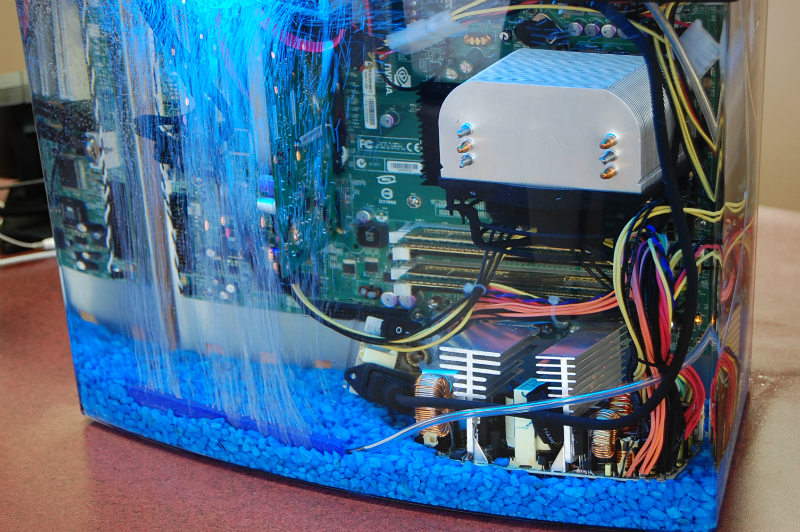Air is better than water
Where there is a will, there is a way

Kind of beautiful
Got to love that condensation that will happen in the PC
At last instance…

It’s definitely easier, simpler and cheaper.
Water cooling can be quieter, though. Some big radiators and you can cool a gaming PC with hardly any airflow.
Yep, it’s the GPU fans that are the real noisy ones. I can tolerate a noctua CPU cooler but GPU’s are like jet engines under load.
I use a PowerEdge T620 as my daily driver, let me assure you the CPU fans at full speed can be heard clearly through 3 closed doors :P
deleted by creator
Nothing like a gamer sandwich

I think it depends on the use case. Personally, I simply don’t jive with the idea of conductive liquids swirling inside my expensive PC.
You’re supposed to use distilled water which is not conductive. At least that used to be the case last I saw liquid cooling.
In the end it’s simply not worth it for me. You still need to radiate the heat out, which usually means a big fan, which most air coolers nowadays have anyways.
I think water is rather rare as a coolant these days. Organics (chemical sense not farming sense) like propylene glycol or some kind of glyme aren’t potentially corrosive to metals if spilled, are harder to grow shit in, have lower volatility, and have a higher thermal limit. Maybe also with a little bit of antifouling agent thrown in. My main gripe with them is that if you do spill them, they don’t evaporate and you’re slipping over the floor for the next few days because you missed a spot.
But yeah, air cooling ftw
Liquid coolers are by definition just an extra heat exchange step unless you’re venting heat into the ocean or something like a nuclear plant. Otherwise, the atmosphere is your final heat sink either way.
Unless a liquid cooling radiator is significantly larger than the air cooler that would fit directly on the CPU there’s no point whatsoever.
there’s no point whatsoever
I’ve been building my own PCs for a looong time, and I’ve been skeptical of using water cooling in any of my machines.
This changed recently for me, when I got my first 4000 series nvidia gpu, that fucker is huge! And it runs hot, spewing all of its heat directly into the middle of the case. I had serious concerns with this gpu + massive cpu air cooler getting in the way of positive airflow through my case.
And this is where water cooling made perfect sense to me: transport the heat away from the cpu, thus clearing a ton of space from the middle of the case, then have a radiator at the top of the case dissipate that cpu heat.
This allows for a ton of air to go through my case, evacuating all of that heat blowing out of the gpu. This also allows for other heat sinks on the mobo and other components to passively cool better
deleted by creator
No coolant is non-conductive after it leaks. It will mix with dust that has built up on the surfaces of the components and become conductive.
The main reason for distilled water is to prevent corrosion and deposits forming inside the loop.
It’s simple for me. Points of failures of air cooling: fans. Failure states: fan fails, system heat protection kicks in and shuts down.
Water cooling? Points of failure: fans, pumps, tubbings, fittings. Failure states: fan fails (best case), worst case? Liquid goes over electronics while they are powered.
Remember kids, if you’re ever feeling useless, you’ll always be more useful than a 120mm AIO.
It’s a fun thing to do. I like my setup (O11 dynamic XL, two 360mm rads, dual pumps, both CPU and GPU blocks), but I wouldn’t necessarily recommend it to anyone. It’s a lot of effort and expense for a little gain. But it’s a hobby on top of a hobby, and that’s fine if you want to go for it.
Yeah, I’m CPU/GPU cooled for a good while now (4-5y). It’s a lot of efforts and make it harder to upgrade. You gain a bit of silence, but it’s really not worth for most people. Like you said, it’s more of a hobbit than anything.
it’s more of a hobbit than anything.
Bilbo Fannings
The fellowship of the rig
…and The Two Towers.
Yeah, upgrading is definitely a pain and more costly. Redoing the tubes if you went with hard tubing is part of it. If you didn’t go with some generic waterblocks you’re stuck with them fitted to the motherboard and good luck reassembling the fan cooler on the gpu if you kept the 50 small screws that held it all together.
That said, I personally won’t go back to air cooled. The low noise and steady temperature are worth it IMO.
I like not having to worry about a leak destroying all my expensive hardware.
I once had a PC with watercooling. It died because I was drinking with a friend and wanted to show it off. So I removed the sidepanel and my drunken self tipped the beer bottle which promptly spilled over the running mainboard. Welp, it was some form of water that killed my PC I guess.
Molten Salt cooling. That can handle CPU temperatures of several million degrees. Your CPU may not handle that, but that’s not my problem.
Not necessarily, but one, it’s a lot cheaper, two, air leaks are not a problem.
the bigger the air leak the better the cooling 🗿
Yes, this is the best argument in favor of air cooling. Air cooling has less points of failure.
With water cooling there’s tons of potential problems that “haha wind go brrrr cooling” just doesn’t produce: Water block gummed up with mold? Take a performance hit. Pump dead? Sucks to be you. Leak in the system? Enjoy replacing your motherboard.
Main issue you might encounter in air cooling is just “fan died, replace fan”. (Obviously not counting thermal interface materials since they are required for both cooling solutions)
Air cooling has less points of failure.
One of the main reasons why brand name workstations and servers are still air cooled… and will probably be for a very long time.
There are some data centers that are water cooled though. I know OVH uses water cooling for some of its servers, and also seems to be developing immersion cooling.
Finally, there’s water in the cloud 😂.
Technically, no, air is a much worse thermal conductor, and most liquids are significantly better. It’s a pretty efficient thermal INSULATOR, however.
The practical applications, however, make the movement of air OUT of your system an efficient cooling method.
Not trying to be contrarian or a smart-ass, but aren’t water cooled systems kinda just air cooled systems with the radiator moved elsewhere?
Yes. The advantage is that you can make the surface area of the air cooling part much, much larger. I had a water cooled system that could do web browsing and other basic tasks with zero fan speed (though it was better to leave it on very low speed to avoid hunting behavior).
Also, there’s some benefits to thermal mass. Short term spikes can be absorbed by the water without increasing fan speed.
I had a water cooled system that could do web browsing and other basic tasks with zero fan speed
Isn’t that the default for (air cooled) notebooks?
With CPUs with very low TDPs, yes.
I once built a home theatre PC that was completely passively cooled. The case was basically the entire heat sink. It got the heat from the CPU through heatpipes. Unfortunately the shitty motherboard died due to unreleased reasons and since then I didn’t have the time or money to revive it.
The cases aren’t even built anymore. No idea why, it was really cool.
Every liquid cooling system is pretty much that. Eventually you need to give it to the outside and the outside is usually air. Heck even river cooling for Power plants ends up “air cooling” through the rivers surface.
All of that air cooling is just radiation cooling in the end
All of that radiation cooling is just entropy cooling in the end.
The heat is not going anywhere in the long run though.
I think that the point is to get a much bigger radiator by moving it to a less cramped location. The point is to make the process more efficient, not to change its nature.
deleted by creator
It is now frowned upon to waste clean water in this fashion.
deleted by creator
Usually copper heatpipes that are found in most air coolers have a drop of liquid in them to boost perfomance.
Which are already build-in and don’t require you to fill them with possible leaks.
Quieter, less point’s of failure, and in many cases taking up less space. I have compressed air for dust. In the consumer sphere and almost any enthusiast sphere, air cooling > > > water cooling
Don’t use compressed air on your fans while they’re plugged into the board! It generates current that feeds into your mobo. Usually nothing bad happens but there can be problems associated with it.
That “usually nothing bad happens” will have to do.
less point’s a failure
Why is a “less point” a failure?
He means ‘less points of failure’.
I CAN’T SPELL it’s less points of failure.
*fewer
The only downside really is RAM slot clearance when you need a beefier air cooler.
Compressed air is magic. Just cleaned my case and it all looks brand new.
Definitely not quieter. I never regretted building my custom loop.
A big ass CPU heat sync and fan like that is usually at least as good as most water cooling options. Often times it scores higher on performance tests. It depends on your exact hardware of course.
I have a huge fuckin Noctua fan like that, and it’s the most silent shit I’ve ever had in a computer. I don’t even understand how they achieved that.
Just a high quality fan I guess. If they’re good they can be really really quiet. If they use brushless motors that can be almost completely silent.
The only true path to water cooling is eliminating the air gaps between your block and CPU surface via full submersion.
Behold! A fully submerged PC!

The patents expire soon, IIRC.
Yes thank you. I went through a water cooling phase, what a pain in the ass. Worrying about the pump, algae, topping off reservoir, leaks ruining your motherboard. The concept is nice, but the reality is high fucking maintenance for no added value.
yea but whatercooling is a complete new space in the whole building process, when building alone gets boring it opens a whole new door to customization, dedication and „learning“ (its not a really usefull skill), but if its something that pleases you, its just freakin cool, even tho it sucks compared to air cooling its a huge subspace in the custom pc scene. its an enthusiast thing for people who are a bit freaky :) i love it and im always happy when i look at my machine
Eh, how does it suck compared to air cooling? I mean, yeah it’s expensive and requires more maintenance, but it’s way quieter and keeps the components cooler than air cooling.
E: a lot of people who are saying all the stuff that could go wrong sound like they’ve never built a WC system and refuse to acknowledge that many of these issues are likely operator/installer error. Installation absolutely does require more care and effort than an air cooled system. I’m not trying to suggest anyone WC or that it’s better than air, you do you, I don’t care, but WC is trouble free if done correctly with good components.
It has more points of failure, and that failure can be more catastrophic. If your air cooler falls off somehow or the fan dies, CPUs these days are pretty good about shutting themselves off before they melt. If your fittings leak, it can destroy everything.
That’s certainly a risk one takes. FWIW I built mine with custom hard lines and fittings, and after the initial shakedown test, have had zero leaks in 6 years. YMMV, I guess.
you can destroy your graphics card before even putting it in the system when you fuck up the installation of your block? your system can leak and everything dies because of a short? one cirtical component in your loop dies (like the pump) and all of the work starts over again? it doesnt suck, but if youre not into this whole builiding thing, it sucks compared to aircooling because you have almost no advantage beside temps and noise, even those can be worse if you dont know what youre doing. it doesnt suck as a whole thing, but compared to aircooling its not worth the money, the work or even the flex of you dont enjoy the process of putting it together!
deleted by creator
I sincerely doubt this as some sort of random or unknown issue. It uses the exact same attach points as a stock cooler or even a good aftermarket cooler. None of those warp the mobo or gpu. Keeping the temperature extremes down should prevent warping, if anything. I’ve been through two WC motherboards and 3 gpus and have experienced zero warping.
The only thing I can offer is either the boards that do warp are cheaply made and unable to support the weight of a good waterblock or the installer is over-enthusiastic about securing it and does so too tightly and thereby causes the damage. My current waterblock has specific instructions regarding installation to prevent over-tightening and damage to the motherboard and components. IOW I suggest it’s an installer problem the vast majority of the time.


















